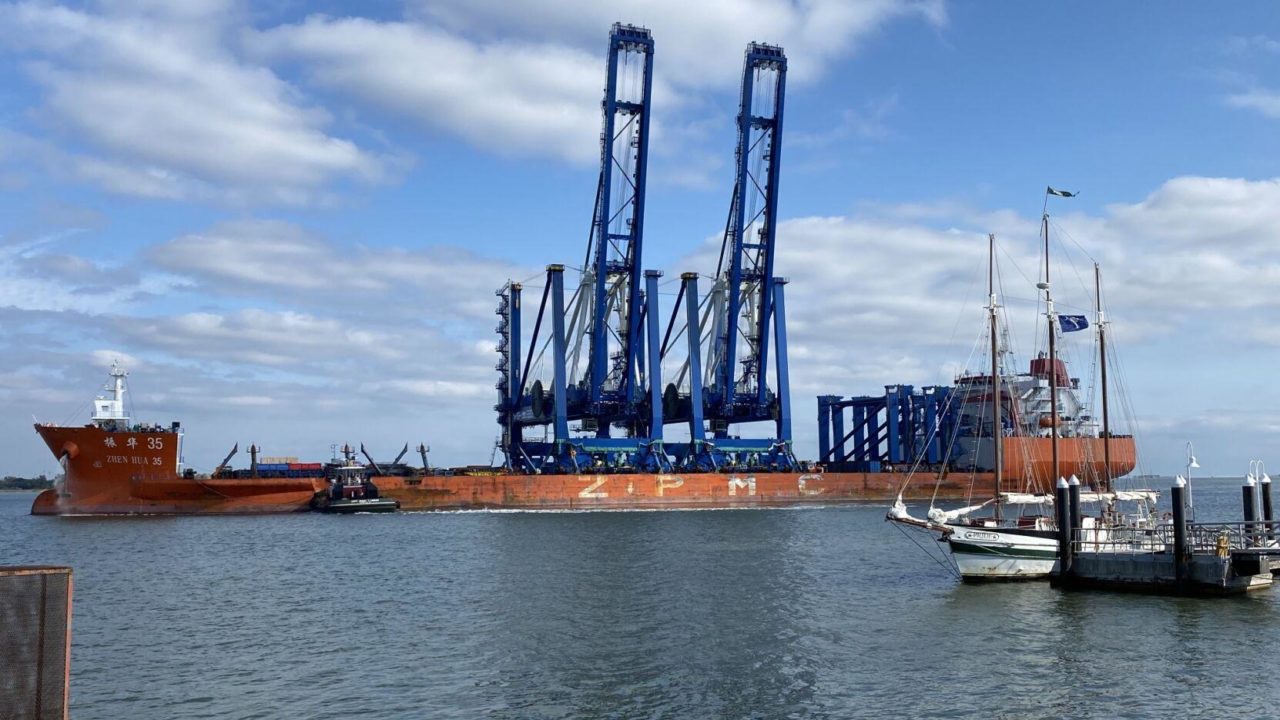Final crane delivery boosts Charleston port’s big ship capacity
The final delivery of bigger ship-to-shore cranes made its way to Wando Welch Terminal on Monday.
The two cranes from Shanghai manufacturer ZPMC will give the Port of Charleston’s busiest container-handling site a total of 15 structures with 155 feet of lift height and the ability to serve three of the biggest container vessels visiting the U.S. East Coast at the same time.
Another wharf at the new Leatherman Terminal in North Charleston features five 169-foot-tall cranes, giving the port a spot for a fourth vessel carrying as many as 16,000 containers.
The newest cranes, which had a brief stay at Columbus Street Terminal on the peninsula before heading up the Wando River, will be assembled and commissioned behind the terminal’s wharf for several months before they’re put to work.
US Labor Secretary gives shoutout to Charleston port workers but stays above the fray
“Taller cranes with wider reach greatly increase our big-ship capabilities,” said Jim Newsome, president and CEO of the State Ports Authority.
The new cranes, at $11.5 million apiece, are part of the SPA’s effort to improve capacity and efficiency at Wando Welch, where the maritime agency has also purchased 65 rubber-tired gantry cranes, built a new refrigerated container yard and strengthened the wharf.
All told, the SPA and state and federal agencies are spending $3 billion on improvements at the port, including the new Leatherman Terminal in North Charleston and a program to deepen Charleston Harbor to 52 feet.
“That’s a lot of investment for any port,” Newsome said. “But we’re an infrastructure business and that’s what we have to do to be successful.”
Century Aluminum is investing $93 million into its Mount Holly smelter near Goose Creek, with the goal of eventually bringing the plant back to full capacity. File/Matt Bise/Staff
Getting back online
Chicago-based Century Aluminum is making “substantial progress” in bringing its Mount Holly smelter near Goose Creek back up to 75 percent capacity, CEO Jesse Gary told analysts last week during a third-quarter earnings call.
Once the $93 million project is completed in 2023, the plant will be able to produce 170,000 metric tons of aluminum per year.
“In order to reach this point, we will ultimately reline all of the pots on line one, which has been operating continuously, and also reline and reenergize half of line two, which has been shuttered since 2015,” Gary said. “The majority of the reline activity will take place this year with the remaining relines occurring in 2022 and 2023 as cells fill.”
Gary said the project has “experienced some delays over the course of 2021 due to COVID, supply chain and hiring issues, mainly from suppliers of materials necessary to complete the pot relining and difficulty in hiring the required amount of new employees to restart and run the additional pots.”
Fast-growing furniture industry setting up distribution sites in Charleston area
He said the labor market and shipping schedules “remain tight, and we are reliant on supplies and hiring occurring on time to complete the project.”
Century beat Wall Street estimates with earnings of $581.4 million in the third quarter. It reported a loss of $52.4 million, or 58 cents per share. Most of the $20 million in capital expenses the company notched during the quarter went toward the Mount Holly restart, Gary said.
Camp Hall sale
Columbia-based Magnus Development Partners has purchased 10 acres at the Camp Hall Commerce Park in Ridgeville where the developer plans to build a 157,500-square-foot speculative warehouse.
State-owned utility Santee Cooper sold the site to Magnus for $814,400, according to Berkeley County land records. Earlier this month, Magnus took out a construction loan totaling $10.2 million to build the warehouse.
Santee Cooper has been marketing the 3,950-acre business park since 2015, when it acquired the property as part of a deal to lure Volvo Cars to Berkeley County. The automaker’s $1.1 billion manufacturing campus is adjacent to the Camp Hall site.

